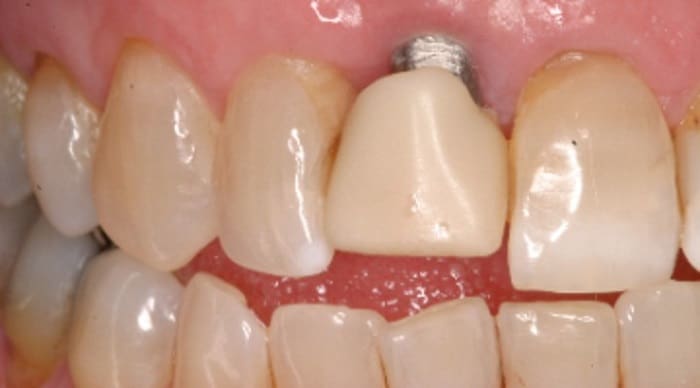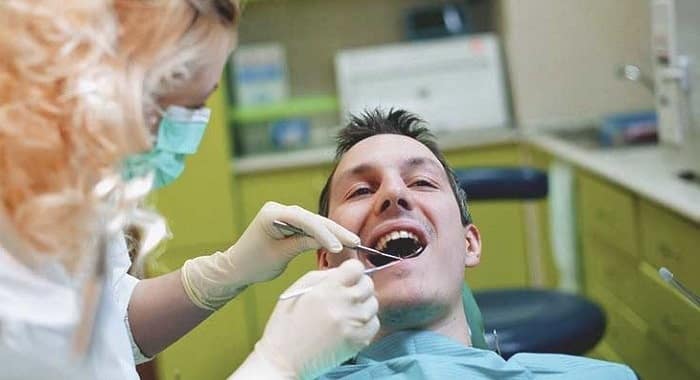Dental implants work. They are predictable and they can change a patient’s life. Today, more and more patients are choosing implants over traditional methods of tooth replacement, and most people will never have to wear dentures or bridges ever again. However, nothing in life is guaranteed and no medical procedure enjoys an absolute 100% success rate. Dental implants are no exception. For the past two decades the number of dental implants placed yearly has steadily increased.
Likewise, as these implants have now been in patients’ mouths for many years, problems are beginning to show up. Some problems are a result of the same expected normal biological issues that plague the teeth; other issues arise from improper treatment by dentists with varying levels of clinical experience. These problems being encountered need to be addressed with care and expertise.
Reasons For Having Dental Implant Problems
There is a plethora of reasons for dental implant problems years later; problems can develop with the implants especially if you are undergoing any of the following health issues:
- Foreign body rejection. This does not frequently, but it can happen. There is a possibility that your body will reject the foreign entity. These are the signs that your body is rejecting the dental implant: swelling, fever, chills, and heightened pain.
- Autoimmune disease – like lupus, rheumatoid arthritis and multiple sclerosis can impede the healing process of your gums and prevent dental implants from fusing properly to the jawbone
- Medications can also affect the healing process – even pills that you take for heartburn can have an impact as well
- Being a smoker – smoking causes poor circulation, the gum area would not receive sufficient blood necessary for healing
Most dental surgeons are good and very careful to not place a dental implant where gum disease is present, however, failure can occur even years later, if a surgeon didn’t operate with precision, an example of this is when a surgeon placed an implant that was too close to the nerve, this can lead to long-term nerve damage.
Occasionally, the body will just reject an implant, viewing as a foreign body, this can lead to extreme pain at the implant site.
If there was any injury to the area around the implant site, this could cause the implant or tooth to loosen – leading to failure.
What Signs And Symptoms Should I Look For?
If suspect a dental implant failure, the following are the signs that there’s indeed a complication:
- You have difficulty chewing.
- The swelling expanded to other parts of your face.
- You have inflamed gums.
- You are experiencing gum recession.
- The implant is getting detached or unclasped.
- You feel a terrible pain.
problems Of Dental Implant
However, as with any procedure, dental implant treatment comes with some potential challenges and risks. Some of the more common problems include infection, injury to other teeth or blood vessels, sinus problems, and nerve damage. While dental implants are generally a safe procedure, you should speak with an approved dentist for professional advice tailored to your needs. Your approved dentist will also ensure that you have detailed information on side effects and potential issues before your treatment. If you’re experiencing pain or discomfort for more than a week after your surgery, see your dentist to ensure that everything is healing properly.
Infection
Infection is usually caused by bacteria in the mouth getting under the gum during the treatment. This generally occurs when a diseased tooth is removed for the implant to be inserted and bacteria from the damaged tooth is left behind. It can also occur if the implant isn’t placed properly, leaving a gap between the implant and the bone, allowing bacteria to enter.
What Sort Of Infection Can Occur After Dental Implants?
Most of the time, dental implant infection occurs in the gums. They can appear red and swollen, and sometimes bleed or leak pus. Other infections, although rare, can occur in the jawbone, which can lead to bone loss.
Dental implant infections in the gums aren’t unusual, but they are generally minor and don’t last long. More often than not, an infection in the gums can be treated with a short course of antibiotics.
An infection to the bone is a little trickier to treat. You will usually need to take strong antibiotics and have the implant removed in order to heal. In severe cases of bone infection following dental implant treatment, part of the jawbone will wear away or die and will have to be removed.
Can Dental Implants Cause Teeth Or Blood Vessels Damage?
Surrounding teeth and blood vessels can be damaged during dental implant treatment. Your smile.com.au approved dentist will be able to determine any potential issues with x-rays and a thorough examination of your teeth before the procedure to try and avoid these problems.
How Does Such Injury/Damage Occur?
It’s possible for the dentist to damage the root of a nearby tooth while drilling into the jawbone to insert the implant. This leads to a damaged tooth and blood vessels. This is rare but if you have any concerns about this risk, you can talk to your Smile approved dentist for professional advice and reassurance.
Treatment for a damaged tooth or blood vessels may require a filling or cap to close the hole in the tooth and protect the pulp. If the pulp has been damaged, a root canal may be required to avoid infection and further damage.
Can Dental Implants Cause Nerve Damage?
Nerve damage can occur during dental implant treatment to the lower jaw. This can happen when an implant is placed too close to the main nerve running through the jawline. Symptoms of nerve damage might be pain, numbness and tingling in the gums, cheek, lips or tongue.
How Does Nerve Damage Occur?
The main nerve that runs through the lower jawline, the inferior alveolar, is very sensitive. If your dentist hits it during your procedure, or your dental implant is screwed in too close to the nerve, it can lead to damage. Your Smile approved can locate the nerve and avoid close contact through careful planning prior to your treatment.
In most cases, nerve damage during dental implant treatment is rare and minor. In order to treat and repair the nerve, the dentist will remove the dental implant. This allows the nerve fibres to reconnect and usually repair themselves within a few weeks, under evaluation by your dentist. In the meantime, your dentist will most likely prescribe you medication to help with any pain.
Can Dental Implants Cause Sinus Problems?
Damage to the sinuses can occur during dental implant treatment to the upper jaw. The bones in our faces are hollow and the spaces inside them are called sinuses. If the dentist doesn’t have enough bone to insert the dental implant, the bone can be perforated. If a bone is perforated, this can cause damage to the sinus and pose the risk of a sinus infection.
How Does A Sinus Problem Occur?
Sinus perforation is rare and mostly occurs when having dental implant treatment in the upper jaw. Damage can happen when the bones in the face are perforated by tools or the dental implant, creating the risk of a sinus infection. In most cases, the dental implant will be removed and the bone repaired before getting a new dental implant put in.
How To Avoid Common Dental Implant Problems?
While dental implants are a fantastic option for many, no dental procedure works 100 percent of the time. However, many of the most common dental implant-related problems are avoidable. If you’re considering dental implants, or already have them, here’s how to help avoid common dental implant issues.
Choose A Qualified Dentist
Make sure you work with a qualified dentist or specialist for your dental implant procedure. An inexperienced or careless dentist can cause any number of problems. For one, dental implants inserted into the wrong position make it likely that the metal post won’t bond to your jawbone, leading to failure. Be sure to ask about your dental provider’s experience with dental implants before you schedule a procedure.
Disclose Your Full Medical History
Even though most people are good candidates for dental implants, not telling your dentist about your full medical history and health could lead to potentially bad outcomes with your dental implants. It is important to disclose everything, even if you think it might not matter.
Practice Good Oral Hygiene
Be sure to follow your dentist’s post-treatment care instructions for your implants, both immediately after the procedure and over the long-term. If you don’t, it could lead to an infection.
Quit Smoking
Smoking is said to be dangerous for your oral health and is the prime cause of dental implant failure. Dental experts say that smoking has several negative impacts such as infection, inflammation around the gums, and inappropriate bonding between the implant and jawbones. With this in mind, we strongly advise dental implant patients to quit smoking.
Report Problems Immediately
Some problems with dental implants happen after your procedure. For example, a newly formed sinus infection can cause pain. If the surrounding tissue doesn’t heal properly, you may experience excessive bleeding and discomfort. It is important to notify your dentist as soon as you experience a problem, so they can help you get back on the road to recovery. The longer an issue occurs without resolution, the longer it could take for your implants to heal.
Routine Check-Ups
Routine check-ups should go without saying, but we all get busy. The easiest way to maintain a regular dental check-up schedule is to make your next routine appointment before you leave the dental office each time you visit.







